How to Create a Booking App: 8-Step Guide
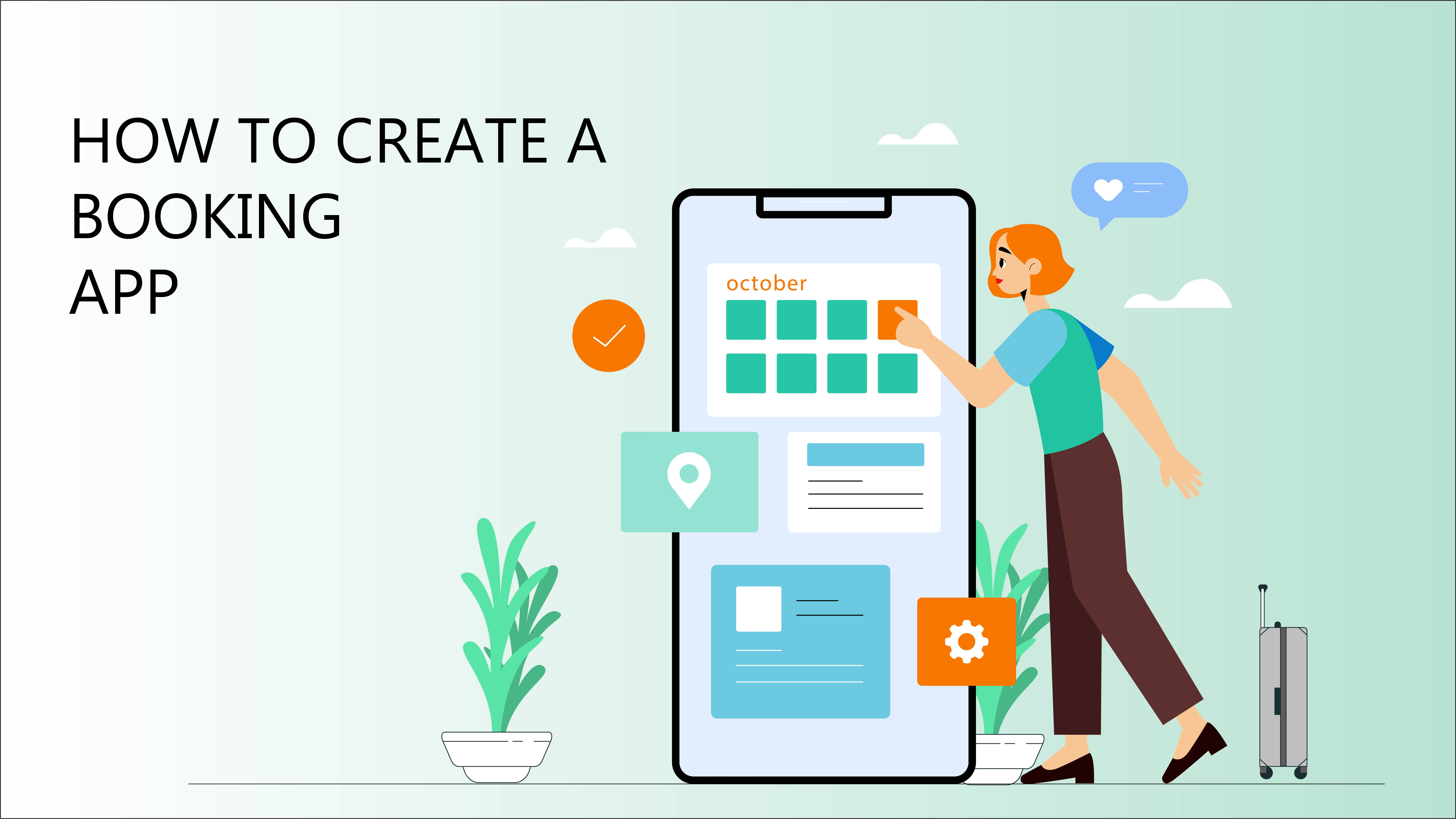
Does your business provide services to clients?
Booking applications will take the quality of provided services to the next level.
Mobile booking apps allow you to book anything with just a few clicks – from food delivery to travel and home cleaning. It can improve the effectiveness and client services for any business – from small businesses such as salons to giant companies such as airlines.
In this article, you’ll learn how to create a booking app from both the technical and business sides.
- The article the main points of booking app development:
- The benefits of making a booking app for businesses
- Major types + examples of booking applications
- Basic & advanced features for a booking app
- How we can help you with booking app development
- Step-by-step process of making a booking app
- Things to consider when you build a booking app
- How Much Does It Cost to Build a Booking App?
Let’s learn how to create a booking app with the best ROI.
What Your Business Can Get from Booking App Development
The success of Booking.com and Airbnb spurred the interest in online booking applications. While traveling used to be the primary industry for such apps, they have become integral to
other industries. Today, any business dealing with customers can benefit from making a booking app – from barbers to restaurants, doctors, hotels, and airlines. And not only companies but also customers benefit from such solutions.
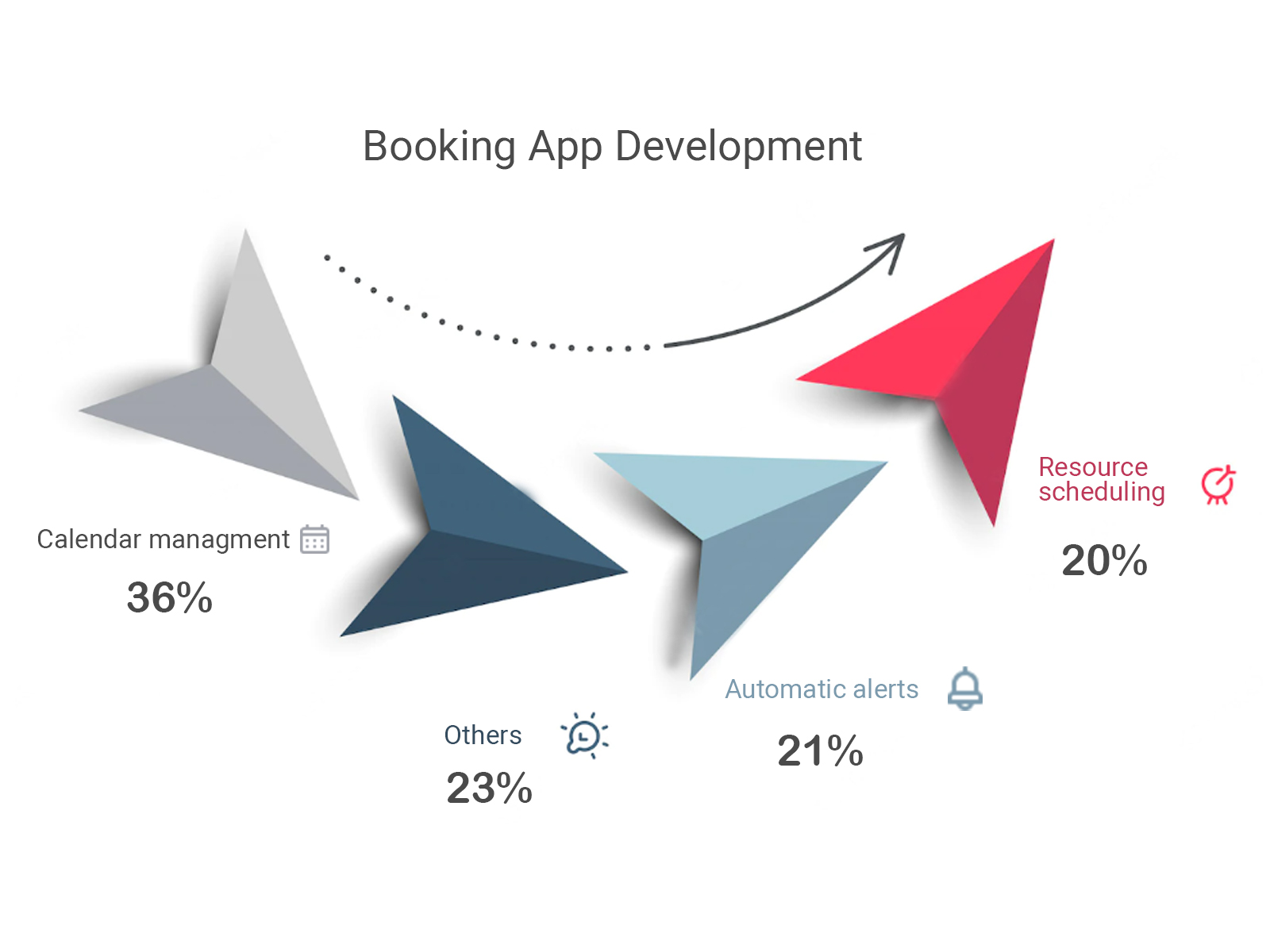
If you look at the statistics, you can get a glimpse of what you can get from booking app development:
- The global online booking software market is expected to grow at a rate of 15.1% through 2024 and reach $360 million in total market value. In 2026, the estimated value of the appointment software scheduling market will reach $546 million.
- 60% of patients prefer to book appointments online.
- 82% of clients use mobile devices to book appointments. Around 16% and 2% are made from desktops and tablets, respectively.
- 25% of all service providers booked online are made by millennials.
- $3.2 billion is the estimated value savings from using online appointment scheduling
- Online appointment research showed that reminders to re-book services result in a 30% growth in repeat appointments.
- Almost 50% of all spa and beauty salon appointments were done online when businesses were closed.
- 83% of customers book travel and restaurant reservations online.
- No-shows cost small-to-medium-sized businesses an average of $26,000 annually in lost revenue.
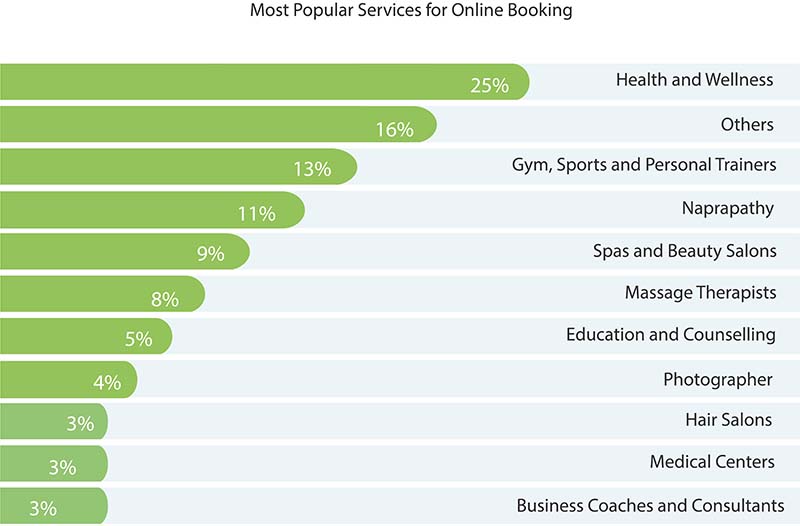
As you can see, online booking benefits businesses of any scale and direction. Whether you work in a beauty sphere, run a hotel, or have a clinic, booking app development can help you save money, increase revenue and improve the customer experience and service.
Below you can see a few reasons why businesses build booking apps:
- User-centric approach – online has become a new norm for people. When they need to book an appointment or reserve a table in a restaurant, they don’t pick up the phone to make a call. Instead, they book the required services online with just a few clicks.
- Source of data – booking solutions allow you to collect information about clients and their preferences. Businesses can use this information to target clients with relevant offers to increase sales.
- Marketing power – the data collected by booking software can be used to create a data-driven marketing strategy. When making a booking app, ensure you know how you’ll collect the data about users and how you’ll analyze and use it later.
- Additional revenue source – a booking solution can become an additional revenue source. Aside from making money by providing some services, you can use different monetization models to maximize revenue. Such models can include commissions, affiliate programs, ads, etc.
- Better brand recognition – an online reservations system is the face of your business online. Match a great app with the matching-level quality of provided services, and users will recognize your brand and share their experience with others. Word-of-mouth is still a powerful marketing technique.
How to Create a Booking App: Major Types & Examples
Let's look at the key types of apps to understand better how to create a booking app. Your decision will impact the final set of features, the required technologies, and even how much you’ll need to pay for booking app development.
On-Demand Booking Apps
On-demand booking applications are great for instant services. Booking software allows users to choose and order goods or services, place an order, and track its progress from shipment to receipt.
Several industries can benefit from the use of on-demand booking applications. Le’ts take a look at them and some examples of online booking systems.
Taxi booking app
When you think about taxi services, Uber is probably the first thing that comes to mind. Taxi booking applications are viral nowadays. Instead of trying luck to hail a taxi in a crowded area, users take their smartphones and order a cab with just a few clicks.
Taxi booking app development is available for transportation companies with their fleet and startups that don’t have cars but work with drivers with their vehicles (like Uber).
Want to know how to build an app like Uber? Check our exhaustive guide that explains all the ins and outs of taxi app development and how to organize the development process step-by-step.
Examples: Uber, Lyft, Ola
Delivery booking app
Having your own fleet of vehicles and drivers is not always an option, especially for small and medium businesses. Such companies mainly outsource product delivery to third-party delivery companies. Such companies handle the whole process of goods transportation – from pick up at the warehouses to the doorstep’s delivery.
If you decide to build a booking app of this type, you can concentrate on a certain industry – such as delivery of medicine, instant delivery of food or flowers, or even the delivery of heavy products.
Examples: Landtran, 24-7 Couriers
Home services booking app
Home services is another industry where booking apps are thriving. Today, users can order home maintenance and cleaning services online. Plumbers, electricians, handypersons, cleaners – you can book the services of any such specialists in an app.
Our team has extensive experience in making booking apps for home services companies. Varpet is one of the apps that we helped our client to build from the ground up. Users of Varpet can find handypersons and other specialists, select the required services timeframe and hire them right inside the app.
Examples: Varpet, TaskRabbit, Handy, Homee on Demand
Laundry services booking app
You don’t need to do your laundry yourself anymore. Almost in every city, you can find a company providing such services. If you’re running such a company, you can expand your services by making a booking app. Such apps allow customers to enter their software and specify the preferred pick-up time. A courier picks up the laundry and returns it once it’s clean.
Examples: ByNext, Rinse
In-Advance Booking Applications
Users of in-advance booking apps can choose the most suitable time and day and schedule appointments in a calendar. Many industries can benefit from booking app development of in-advance solutions.
Hotel booking app
Hotel booking apps provide users with several benefits. They help travelers to find and book hotel rooms and accommodations for business trips or vacations. Users need to enter the preferred location, booking dates, number of guests, and the booking software automatically selects the most suitable options and offers them to the users.
Booking apps of this type, like Airbnb, have become extremely popular as you can find hot deals and last-minute bookings for the best prices.
Examples: Booking.com, Airbnb, HotelTonight
Flight & travel booking apps
Flight booking apps are a part of the enormous travel industry. Such applications help customers find, schedule, and book flights. They only need to enter the departure, destination, and flight dates. Some apps allow users to book flights right in the apps, while others redirect them to airlines' websites for bookings. In addition to flights, apps of this type often allow renting cars, so users can step out of the plane and right into the rented car.
Examples: SkyScanner, FlightStats, TripIt, Maven
Restaurant booking app
Online booking services of this type allow users to find restaurants and make a reservation for the needed time and date.
Examples: Yelp
Food and beverages apps
On-demand food delivery is a rapidly growing business area that is expected to amount to $223.7 billion by 2027. Food ordering has become even more popular with the COVID-19 outbreak. Such solutions allow users to get food from their favorite places without leaving their homes. They open an app, find a restaurant, café, or grocery store, make an order, pay for it and wait for a courier to deliver it.
Usually, such platforms involve three parties – users, couriers, and customers. However, some restaurants build their delivery apps, especially if we talk about big brands.
Examples: Uber Eats, Starbucks, DoorDash
Healthcare booking apps
Online booking of medical services is also on the rise. Such applications allow patients to book appointments at doctor’s offices online. If you’re going to explore how to create a booking app of this type, consider also providing the telemedicine option for patients who need to get a consultation that doesn’t require a visit to the doctor’s office.
Examples: Zocdoc, Practo, Figurel
Beauty services app
Beauty is another industry that can benefit from booking app development. Customers can find barbers and hairdressers in predefined locations, look through their portfolios and ratings, book appointments and even pay for services in the app.
Examples: Treatwell, Stylisted, Missbeez
Events and entertainment
Events and entertainment booking applications encompass a lot of activities. You can book a venue for an event, buy movie tickets, or tickets to sports games, festivals, concerts, etc.
Examples: Eventbrite, Appy Couple, Facebook Events
Appointment app
Appointment aggregator apps allow booking almost anything – from a meeting with a lawyer to a party and school appointment.
Examples: Square
Features for Making a Booking App
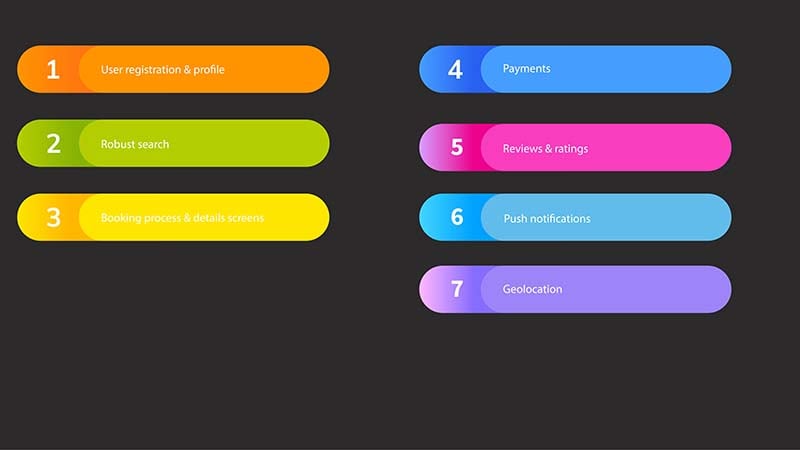
If you want to learn how to make a booking app, you need to understand what booking app features you need to develop. Let’s take a look at some basic features that you can find almost in any mobile booking application and some advanced ones that will help your app stand out from the crowd.
Key Features to Make a Booking App
- User registration & profile
User registration is where users decide if they’ll proceed with it or drop the app. The process of user signup and sinning should be made as simple as possible. Ideally, it shouldn’t take more than a few seconds. Thus, authorization with social media, such as Facebook, Google, or Instagram, is a must-have today, as it allows users to create an account and then log in with a single tap.
- Robust search
The user flow of booking applications includes a step where users search for some services in the app. That’s why it’s so important to integrate your app with a robust search solution, such as Alogia. The search system you choose should provide multiple filtering options and different categories, be typo tolerant and provide predictive auto-complete features. Also, when there is no search result, don’t show the ‘no results found' message. Instead, the search system should offer suggestions with the most relevant results that might interest users.
- Booking process & details screens
How you organize the booking process can decide the fate of your application. The user flow should be fast and smooth. It’s not the place to try and stand out with the intricate gestures required to make a booking. Users expect everything to be simple and familiar to them. Design the app with users in mind, try to make it as simple as possible, and you won’t lose any customers.
In most cases, people buy with their eyes. Depending on the type of the app, you’ll also need to show photos of apartments or hotel rooms, maps of locations, photos of products, etc.
- Payments
As a part of booking app development, you’ll need to integrate your application with various payment gateways. Provide users with the most popular payment options, such as Apple and Google Pay, PayPal, credit cards, etc. Also, if your business allows it, you can provide an option to make payments in cash.
- Reviews & ratings
Many factors influence customer trust, and customer reviews are the most powerful. The availability of reviews and ratings in the app allows users to make well-informed decisions and choose the best service providers.
- Push notifications
Push notifications can make the use of an app more enjoyable for users. This feature will keep your customers updated on the latest booking status changes, the date of the booked event or delivery, and so on.
Push notifications are also the most powerful tool for user re-engagement and retention. You can remind users about abandoned bookings, notify them about the best offers for rent in the location of their interest or provide them with special offers and discounts.
- Geolocation
Geolocation is a must-have feature for booking apps, as they deal with locally provided services. Hence, users should be able to view maps and nearby locations to understand better where the business is placed and how to get to it.
Advanced Features for Booking App Development
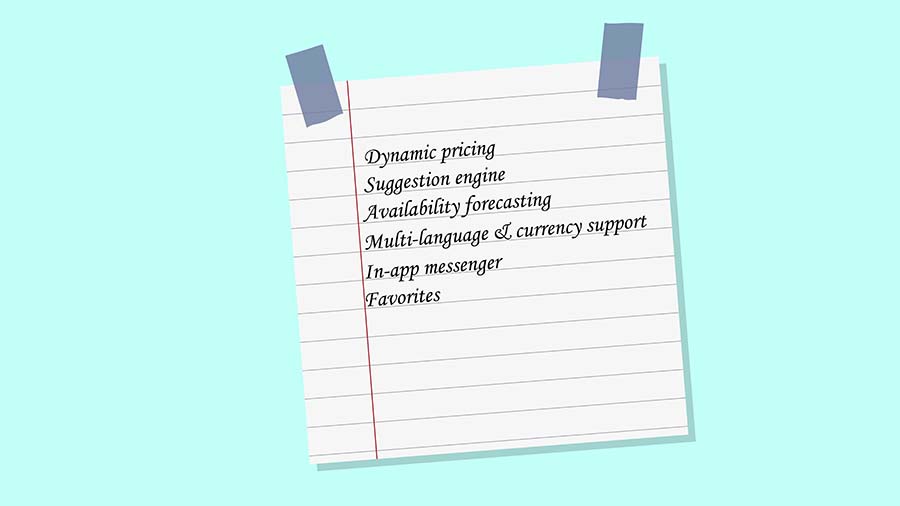
If you’re wondering how to make a booking app that will be different from others, take a look at the list of additional features. Their implementation usually takes more time, and companies typically don’t implement them with the first app iterations to speed up the development process and cut the development costs. However, you can consider them for future app iterations.
- Dynamic pricing
Last-minute bookings and seasonal sales are great for retaining customers. As booking apps gather a lot of user information, you can use it to personalize such special offers. For example, if someone looked up a tip to Miami and didn’t book any hotels, you can send them a discount to encourage them to take a trip and make a booking through your app.
- Suggestion engine
Sometimes, users can’t choose their own. If you provide them with a timely and relevant recommendation, they will make a booking through your app instead of going to competitors. Personalized recommendations improve customer experience and can also boost your financial results.
- Availability forecasting
Forecasting can become one of the unique selling propositions of your booking software. This feature uses a similar mechanism as dynamic pricing and suggesting engines. The collected data is used to forecast available rooms, seats at beauty salons, and the best dates to book a flight.
- Multi-language & currency support
There are a lot of APIs and third-party solutions that allow the quick implementation of such a solution. Autodetection of the language and currency is a nice-to-have feature for apps that work across different locations. The support of this feature improves customer experience and provides users with more flexible payment methods.
- In-app messenger
In-app messaging requires a customer support team or an AI-powered chatbot. Such a feature saves a lot of time for customers, as they don’t need to call if they have any questions about the available booking spots, cost, or anything else.
Chatbot implementation, on the other hand, will save your team a lot of time and manual work. There are a lot of questions that users ask repeatedly. You can program a chatbot to provide answers to frequently asked questions with no human involvement. When there is some complex question that the chatbot doesn’t know an answer to, such requests are redirected to the support team.
- Favorites
Favorites is a nice-to-have feature, especially for food delivery apps. After adding products or meals to the favorites, users can quickly reorder them with just a few clicks.
- Features for the Admin Panel
When you build a booking app, you must manage it and all its users. You’ll need to create an admin panel for that. Below is a list of key features that an admin panel should support.
- User roles & staff management
The primary purpose of booking applications is to reduce the workload on employees by automating tasks. If your booking solution works with multiple service providers, you need to have the ability to add, delete and edit the list of providers.
Additionally, you’ll probably need to set up different access rights for employees. For example, a super admin should fully control the system and other users. Admins can manage service providers and users, cancel and change reservations, etc. Employees have access to their bookings and can manage them.
You can create as many user roles as your business requires.
- Appointments management
If you want to know how to make a booking app for your own business, you need to add booking management capabilities. For instance, built-in calendars can show information about scheduled, pending, canceled, rescheduled and completed appointments. Also, you can see when your employees are available and manage their availability according to their individual work plans.
Our Experience in Booking App Development
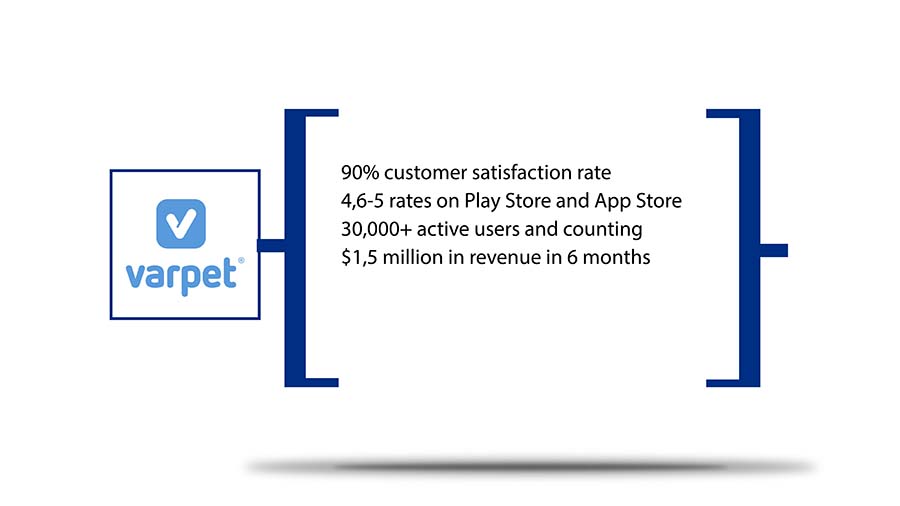
The Addevice team is familiar with on-demand services. We know how to make a booking app from our own experience of delivering apps for clients from all over the world.
Varpet is an on-demand marketplace for home and personal services. The solution connects clients who need help with home maintenance with local workers who provide the required services.
Here are a few features developed:
- A single platform to connect clients and service providers
- In-app messaging and payment tools
- Advanced filters to find service providers faster
- Detailed profiles of service providers
- Making bookings and paying for services in the app
- Security system to ensure the safety of users and payments
- Data collection, processing, and analysis
In just a few months, the solution achieved remarkable results:
- 90% customer satisfaction rate
- 4,6-5 rates on Play Store and App Store
- 30,000+ active users and counting
- $1,5 million in revenue in 6 months
How to Create a Booking App: 8 Steps from an Idea to App Release
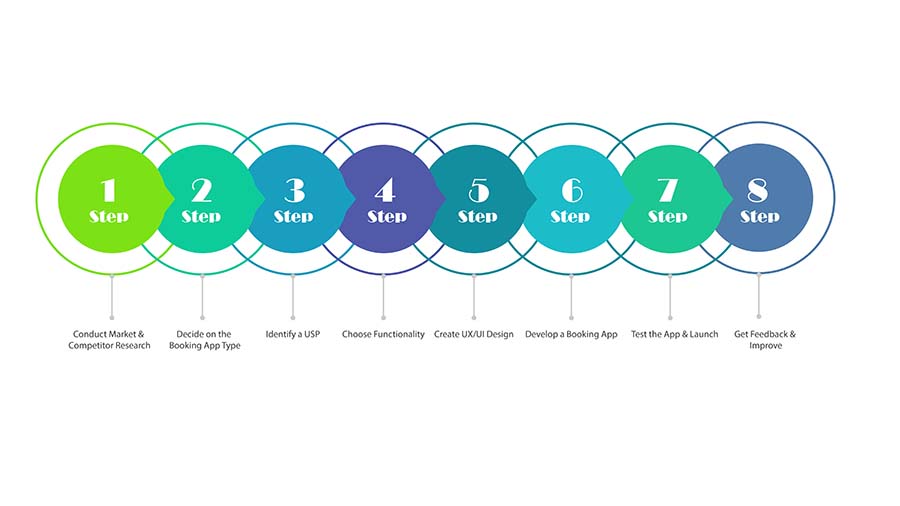
Booking app development can be a challenging process with many steps involved. Check the 8-step guide for detailed instructions on how to create a booking app and what it takes to release an app to the market.
Step 1: Conduct Market & Competitor Research
The development of any application starts with market and competitor research. Go through available applications in your industry, check out your competitors' solutions, and analyze them for weak and storing points.
Initial market research is a great way to understand the competition better and why some apps become successful while others fail to attract users.
Step 2: Decide on the Booking App Type
So, what type of booking app are you going to develop?
As you already know, there are a few types available depending on your industry and business objectives. Before making a booking app, decide what you’ll need to make it work.
For instance, if you want to create an app like Uber, you need to decide on the business model depending on whether you have your fleet and drivers or want to adopt the mode of Uber.
Step 3: Identify a USP
What will make your app different? Why should users turn to it instead of competitors? Defining a USP (Unique Selling Proposition) will help you be better than the competition. A USP can be anything – from some unique feature that no other app has to lower prices or the ability to make last-minute bookings.
Step 4: Choose Functionality for Booking App Development
Before starting the development process, you need to have a clear idea of the final product. You need to finalize the list of features to avoid making last-minute changes that can skyrocket your development budget.
Step 5: Create UX/UI Design
Making an app user-friendly and attractive is the main task of UX and UI designers. Here are a few principles to follow:
- Minimalistic user interface that’s not overcrowded with unnecessary information that districts customers
- Smooth and fast user flow through the app to reduce abandonments and increase conversions
- Consistent design through all the screens and pages of the app
Step 6: Develop a Booking App
You’ll need to hire app developers for booking app development. As a product owner, you should be involved in the process and communicate with the team all the aspects of development. The goal is to ensure you’re on the same page and all the requirements are clear.
Below is a possible tech stack for making a booking app. However, the tech stack of your app may be different due to some other requirements and features.
- Programming language: Swift or Objective-C for iOS; Kotlin or Java for Android
- Backend development: Python or PHP
- Calendar integration: Google Calendar
- Payment integrations: Braintree, Stripe, Google Pay, Apple Pay
- Push notifications: OneSignal
- Maps integration: Google Maps API
Step 7: Test the App & Launch
Before your app hits the app stores, you must check it for bugs and errors. Quality Assurance is an ongoing process that can run through the whole process of app development. You’ll also need to make your app compliant with the requirements of different app stores.
Step 8: Get Feedback & Improve
After you’ve got feedback from the first customers, it’s time to make changes to your application. Customer feedback will guide you in the right direction, as there are always a few areas for improvement.
Things to Consider While Making a Booking App
As mentioned, booking app development may be a daunting and challenging task. A lot of factors should be considered to create a great application.
- Data security
Any application should start and end with data security. Keeping users’ data secure is not only good practice and liability for all businesses behind mobile applications. All sensitive data, such as payment details, must be encrypted and stored in a non-identifiable form. Multi-factor authentication and a limited number of login attempts will help you prevent data breaches and brute-force hacker attacks.
- Integration with third-party services
A booking application works with at least a dozen third-party integrations. There are different payment gateways, APIs, and solutions that you can use within your application. When using them, you need to ensure there are conflicts between them, and they don’t impact the app's performance.
- Consider building a booking website
Now all customers are ready to install a native application. Therefore, building a website is a logical step for a company that wants to cover as many potential customers as possible. The development of a booking website can bring several benefits, such as additional brand representation, the power of SEO and Google, better data collection, wider audience reach, and additional marketing channels.
You can create a website along with the app or plan to release it with subsequent versions of your application. Either way, you need to explore how to make a booking website if you want to have a competitive advantage.
How Much Does It Cost to Build a Booking App?
You’ve probably noticed that mobile app development companies avoid telling how much it costs to develop applications. They do so not because they don’t want to know it. They do so because it’s impossible to provide a correct app estimate without knowing all the requirements.
The rough app development cost ranges between $60,000 and $90,000 for a single version with the simplest set of features and a development time between three to six months. The more features and integrations you add, the higher the price will be. In some cases, app development costs can reach $500,000 or even higher if you’re building a complex application with some features powered by Artificial Intelligence and Machine Learning.
You can always get in touch with us to get a more precise app estimate.
How to Create a Booking App: Key Takeaways
Booking applications continue to gain traction. With the projected growth in the upcoming years, there is no surprise why companies are exploring the idea and learning how to create a booking app/p>
- The success of an app is usually brought down to a few factors:
- Quality of market research
- Understanding of the market and target audience
- Financial investments you’re ready to make
- The development team you’re hiring
Booking App Development, Mobile Industry, Ecommerce apps, Multi Screen Apps, Video Meetings, Apps for Doctors, Make a Chatbot, Mobile Healthcare, Mobile Business, App Like Instagram, Theme, Cloud Based Application, Uber Like App Development, Theme, Cloud Based Application, Booking App, Messenger Marketing
Let's To Discuss Your Business Idea
Embark on the journey of creating your own booking app
Our Approach Includes:
✅ User-friendly interface design
✅ Seamless booking process integration
✅ Proven success in booking app development
Table of contents
FAQ
There are a lot of places where you can find mobile app developers. You can start your research on platforms like Clutch to evaluate a company, its experience and expertise quickly. You can also contact the Addevice team, and we’ll be glad to assist you in booking app development.
Booking app development costs usually start at around $60,000 for a single app version. The costs will double if you build an app version for iOS and Android. However, the final price will depend on many factors, such as features that need to be implemented, timelines, outsourcing country, etc.
Booking app development usually takes 3 to 6 months for a single app version (iOS or Android). Depending on your requirements, the number and complexity of features and integrations, the development time can take up to 9 to 11 months.
On-demand and in-advance are two of the major types of booking apps. Each of the types serves particular industries. For instance, on-demand apps are popular among taxi, delivery, home, and laundry services companies. In-advanced apps are used in the hotel, travel, restaurant, food and beverages, healthcare, beauty, and entertainment industries.
 How Much Does It Cost to Develop a Travel App: A Comprehensive Guide
How Much Does It Cost to Develop a Travel App: A Comprehensive Guide
Flight Data API
This article is very good thou, thanks for sharing this!